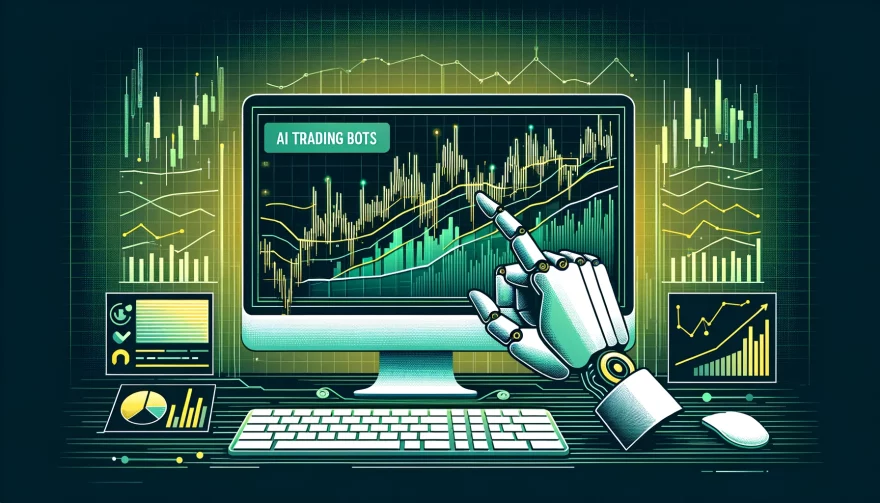Navigating the world of trading platforms can be overwhelming, especially when you want to leverage the power of artificial intelligence (AI) in your trading strategies.
AI trading platforms are not created equal, and knowing which one to pick can significantly affect your trading success.
In this article, I take you through several factors to consider when choosing an AI bot for trading.
What is AI trading?
Before diving into the selection process, it’s essential to understand what AI trading is.
In simple terms, AI trading involves the use of automated algorithms and machine learning models to analyze market data, make trading decisions, and execute trades without human intervention.
These platforms are designed to scan market conditions 24/7 and are often more accurate and efficient than manual trading.
When deployed and used right, these AI bots can be quite profitable for trading
How to choose AI trading platform (9 Factors)
1) User experience
The last thing you want is to navigate a clunky interface while trading.
Choose a platform that is intuitive and offers a seamless user experience. A clean design, easy-to-use features, and a straightforward navigation menu are must-haves.
Look for platforms that offer a demo version, so you can get a feel for the UI before committing.
2) Algorithmic capabilities
Examine the AI algorithms the platform uses.
These could range from basic rule-based systems to complex neural networks and natural language processing models.
The platform should provide transparency about how their algorithms work and how often they’re updated.
AI trading platforms tech
- Rule-Based Systems: Follow a set of predetermined rules.
- Machine Learning: Learn from data without being explicitly programmed.
- Neural Networks: Designed to mimic the human brain’s interconnected neuron structure.
- Natural Language Processing (NLP): Analyzes news articles, social media, and other text data for sentiment analysis.
Most AI bots for trading leverage all these technologies to make accurate market predictions.
3) Cost
AI trading bots can be quite expensive, and costs can quickly add up if you have to purchase and install AI robots from a platform’s marketplace, as with the case with most platforms.
Do a cost-benefit analysis and choose a platform that offers the most value for the money you’re willing to invest.
4) Security features
When you’re trading online, security is non-negotiable.
Ensure the platform employs state-of-the-art encryption, and two-factor authentication, and has a solid privacy policy.
5) Asset coverage
What financial instruments can you trade on the platform?
Whether you’re interested in forex, stocks, options & futures, or cryptocurrencies, make sure your desired assets are supported.
Note that while most AI trading platforms cater to several types of assets, there are some that only specialize in a given asset trading.
For instance, Cryptohopper and Coinrule are for crypto trading only while MetaTrader 5 focuses on Forex and Exchange markets.
6) Community & customer support
Good customer service can be a lifesaver. A responsive, knowledgeable support team can make a world of difference in your trading experience.
Also, platforms with active user communities can be a treasure trove of knowledge and support.
Another thing to consider here is the availability of educational resources. Look for platforms that offer educational resources to help you make the most of the technology.
7) Automation capabilities
Automation is the core of an AI trading platform, but the level and type of automation can differ.
Levels of automation:
- Semi-automated: Requires human approval for trade execution.
- Fully automated: Executes trades without human intervention.
Types of automation:
- Signal generation: Identifies buy or sell signals but leaves the execution to you.
- Portfolio management: Auto-balances your portfolio based on set criteria.
- Trade execution: Executes buy or sell orders automatically by connecting to brokers.
Most AI-trading platforms provide options for both semi and fully automated trading, allowing you to choose based on your comfort level.
8) Supported brokers
Not all AI trading platforms will be compatible with every broker.
Check to see if the platform supports your broker or if you need to switch to a broker compatible with the platform.
Trading services like StockHero often list compatible brokers on their websites.
9) Real-time data and analytics
A platform is only as good as the data it uses.
Check if your platform offers real-time data and what kinds of analytical tools are available for you to dissect this data.
10) Reviews and recommendations
Don’t rely solely on the information provided by the platform.
Check out reviews from trusted sources, such as Investopedia, and consider recommendations from professionals in the industry.
How to finalize your choice
After considering all these factors, you may still find multiple platforms that meet your needs.
In this case:
- Compare the free trials: Use the trial period to compare them head-to-head.
- Check for hidden fees: Always read the fine print to uncover any hidden fees that could impact your profitability.
- Read user reviews: Look for reviews from users who are trading in markets similar to yours.
- Consult your network: If you know experienced traders, ask for their recommendations.
- Trust your instincts: Sometimes, your gut feeling is the best gauge. If a platform doesn’t feel right, it probably isn’t for you.
Questions to ask before making a choice
- Is the platform regulated by any financial authorities?
- What’s the minimum deposit requirement?
- How easy is it to withdraw earnings?
- Does it offer a mobile app for trading on the go?
Noteworthy AI trading platforms
Here are some great AI trading platforms you might want to consider:
- MetaTrader 4/5 (MT4/MT5): MT4 and MT5 are popular trading platforms that offer automated trading through Expert Advisors (EAs), which are AI-based trading bots.
- Capitalise.ai: Capitalise.ai is a cloud-based AI trading platform that allows traders to create and deploy automated trading strategies across multiple asset classes.
- eToro: eToro is a social trading platform that offers a variety of AI-powered tools, such as CopyTrader and SmartPortfolios.
- Trade Ideas: Trade Ideas is a software platform that uses AI to generate trading signals.
- Tickeron: Tickeron is an AI trading platform that offers a variety of automated trading strategies for stocks, ETFs, forex, and cryptocurrencies.
Final thoughts
Choosing the best AI trading platform is a critical decision that can make or break your trading career.
Take your time to evaluate different platforms, keeping in mind the criteria mentioned above.
The ideal platform should be user-friendly, and secure, have a high degree of prediction accuracy, and fit well within your budget.
I hope this guide on how to choose AI trading platform has given you some insights for the next time you go looking.


